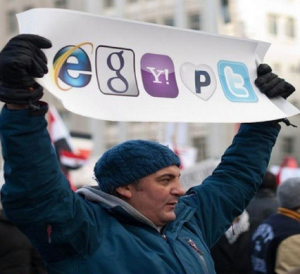 I obviously have a Civic Media blog (I mean, its right in the title). But a few people have asked me what exactly civic media means. I usually spit ball some sort of answer, not really defining it, but giving examples of civic media and what it does.
I obviously have a Civic Media blog (I mean, its right in the title). But a few people have asked me what exactly civic media means. I usually spit ball some sort of answer, not really defining it, but giving examples of civic media and what it does.
If examples alone were the definition then civic media could be described as open source software, social media, technological innovation, slacktivism, smartphones, facial recognition, DRM, sustainability, unpleasant design, et cetera.
 Today in class, my classmates and I formed groups and wrote working definitions for civic media. As such, we discovered that civic media can have various definitions that, while true, describe different aspects.
Today in class, my classmates and I formed groups and wrote working definitions for civic media. As such, we discovered that civic media can have various definitions that, while true, describe different aspects.
Ricarose Roque defines civic media as “any use of a medium that empowers a community to engage within and beyond the people, places, and problems of their community.”
This seems like a great definition; it is clear and concise. But lets break down the parts of civic media:
- CIVIC – in relation to a city or community and the people in it
- MEDIA – the means of mass communication through a medium
Now, taking what each part of civic media means we can begin to try and understand a working definition.
My group and I made an original definition of civic media, defining it as “how one citizen can communicate a message to the community by means of online/offline platforms; highly influential or consumed regardless of merit”.
This is a very able definition – there are a lot of key words in play. For example, there is an emphasis on the individual as well as the community. We mentioned that civic media can be encouraged by online and offline media platforms; everything from newspapers and television to Facebook and tumblr. My group also made a point to comment that the message is usually highly influential or consumed (meaning A LOT of people see it), but that the message does not necessarily have to have merit to be influential/consumed.
While we like our working definition, the professor commented that civic media does not always have positive effects; it can have negative influences on a community or group of people.
Civic media can be positive because it can engage and empower a community. It can foster relationships and reduce communication barriers. Civic media can also create opportunities for individuals and communities look  to solve a problem or promote a solution. Furthermore, it can inspire innovation and deliver that delivers collective information to influence or engage an individual or group within and beyond the people/community. Civic media can support rarely heard voices.
to solve a problem or promote a solution. Furthermore, it can inspire innovation and deliver that delivers collective information to influence or engage an individual or group within and beyond the people/community. Civic media can support rarely heard voices.
However, civic media can also have some negative effects. It can lead to isolation and reduce human contact. Civic media can effect productivity and distract individuals and communities from issues of reality. Moreover, it can encourage people to disengage on a personal level and engage on a technological one. Civic media can blur the line between roles like reader-publisher and audience-broadcaster.
Civic media can facilitate communication structure that become a means to an end, be it positive or negative. As such, my group and I improved our description of civic media. Our altered working definition for civic media is: “how one citizen, with the support of a community or individuals, can negatively or positively communicate a message to the community by means online/offline expression. It can be highly influential or consumed  regardless of merit. It can stir up engagement or further isolation of individuals or communities”.
regardless of merit. It can stir up engagement or further isolation of individuals or communities”.
What do you think of our new definition? Do you agree or disagree with certain points?

